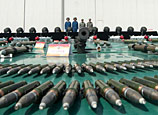
Harsh property curb policies have prevented property bubbles from inflating further. The government has employed strong administrative forces to regulate pricing, and those measures have surely stemmed speculation and kept prices from skyrocketing.
The construction of subsidized, low-income housing and the expansion of property tax trials will also boost supplies and tame prices.
In fact, speculation that China's property bubbles will burst is likely to be just that -- speculation. Given that China's deepening urbanization drive is driving demand past what land supplies can offer, it is illogical and unrealistic to believe that prices will stay flat or fall in the coming decades.
Now, the government's duty is to prevent prices from surging recklessly, an event that could potentially trigger the kind of social unrest that the country can not afford.
China has lowered its GDP growth target to 7.5 percent for 2012 and 2013, down from 8 percent for the eight previous years. Readings in the past four quarters have stayed below 8 percent, but that has not given rise to jitters, as the government has prioritized balance over speed, and quality over quantity.
At Thursday's meeting of the Standing Committee of the Political Bureau of the CPC Central Committee, which was presided over by General Secretary of the CPC Central Committee Xi Jinping, who is also China's president, the central authority vowed to make greater efforts to bring out the potential of domestic consumption, lift or delegate the government's authority in approving investment projects and strictly limit the indiscriminate expansion of energy-inefficient and polluting industries.
The meeting offered details on the Political Bureau's future mind-set in managing the world's second-largest economy under new circumstances. Limiting the government's power in the approval of investment projects has been seen as the most courageous and pragmatic reform announced by the new cabinet yet, and it is expected to help unleash greater growth potential.
Though the days of being obsessed with speed have passed in China, this is not the case among foreign banks and investors. As China acclimates to tepid growth, foreign buyers will continue to fuss about the slower data, as if the slowdown is a sign that the end is near.
Since the top leadership knows that successful restructuring will take time and effort, a one-off stimulus package is unlikely.
China has the patience to embrace healthy growth, but short-sellers also need to exercise patience to secure safe profits.

















 Heavy rain affects traffic in S China
Heavy rain affects traffic in S China


![]()
